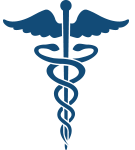
Ophthalmologist
 An ophthalmologist — Eye M.D. — is a medical or osteopathic doctor who specializes in eye and vision care. Ophthalmologists differ from optometrists and opticians in their levels of training and in what they can diagnose and treat. As a medical doctor who has completed college and at least eight years of additional medical training, an ophthalmologist is licensed to practice medicine and surgery. An ophthalmologist diagnoses and treats all eye diseases, performs eye surgery and prescribes and fits eyeglasses and contact lenses to correct vision problems. Many ophthalmologists are also involved in scientific research on the causes and cures for eye diseases and vision disorders.
An ophthalmologist — Eye M.D. — is a medical or osteopathic doctor who specializes in eye and vision care. Ophthalmologists differ from optometrists and opticians in their levels of training and in what they can diagnose and treat. As a medical doctor who has completed college and at least eight years of additional medical training, an ophthalmologist is licensed to practice medicine and surgery. An ophthalmologist diagnoses and treats all eye diseases, performs eye surgery and prescribes and fits eyeglasses and contact lenses to correct vision problems. Many ophthalmologists are also involved in scientific research on the causes and cures for eye diseases and vision disorders.
Optometrist
O ptometrists are healthcare professionals who provide primary vision care ranging from sight testing and correction to the diagnosis, treatment, and management of vision changes. An optometrist is not a medical doctor. An optometrist receives a doctor of optometry (OD) degree after completing four years of optometry school, preceded by three years or more years of college. They are licensed to practice optometry, which primarily involves performing eye exams and vision tests, prescribing and dispensing corrective lenses, detecting certain eye abnormalities, and prescribing medications for certain eye diseases.
ptometrists are healthcare professionals who provide primary vision care ranging from sight testing and correction to the diagnosis, treatment, and management of vision changes. An optometrist is not a medical doctor. An optometrist receives a doctor of optometry (OD) degree after completing four years of optometry school, preceded by three years or more years of college. They are licensed to practice optometry, which primarily involves performing eye exams and vision tests, prescribing and dispensing corrective lenses, detecting certain eye abnormalities, and prescribing medications for certain eye diseases.
Optician
 Opticians are technicians trained to design, verify and fit eyeglass lenses and frames, contact lenses, and other devices to correct eyesight. They use prescriptions supplied by ophthalmologists, who are medical doctors and surgeons or optometrists, but do not test vision or write prescriptions for visual correction. Opticians are not permitted to diagnose or treat eye diseases.
Opticians are technicians trained to design, verify and fit eyeglass lenses and frames, contact lenses, and other devices to correct eyesight. They use prescriptions supplied by ophthalmologists, who are medical doctors and surgeons or optometrists, but do not test vision or write prescriptions for visual correction. Opticians are not permitted to diagnose or treat eye diseases.
How is an Ophthalmologist, an Eye M.D., different from other eye care providers?
You may have heard of other eye care professionals, such as optometrists and opticians. They are trained and authorized to provide certain aspects of vision care, but they are not medical doctors. Optometrists generally provide routine vision care services, prescribe eyeglasses and fit contact lenses. Optometrists may not perform any form of surgery. Opticians dispense eyeglasses, but do not perform eye exams.
What does “board-certified” mean?
Board certification means that an ophthalmologist, an Eye M.D., has taken and passed a rigorous examination, which covers all aspects of medical and surgical eye care. These examinations are voluntary. An ophthalmologist does not have to be board-certified to practice. The American Board of Ophthalmology (ABO) is the main certifying body for ophthalmologists in the United States. Medical specialty boards – including the ABO – are accredited by an “umbrella” organization that sets standards for certifying physicians.
What does “subspecialist” mean?
A general ophthalmologist provides comprehensive eye care. While all ophthalmologists specialize in treatment of eyes, some choose to concentrate in a more specific area. This is usually after completing a fellowship. Some subspecialties focus on treatment of a particular disease, such as glaucoma. Others may specialize in a specific part of the eye like the retina or the cornea, or in a particular field such as pediatric care.